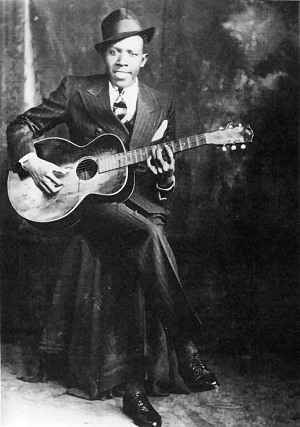CD REVIEW
When The Sun Goes Down, Blind Willie McTell, BMG Music, 2003
Recently I have been doing a run of reviews on old time country blues players that have included the likes of Mississippi John Hurt and Son House. Here we are getting a little slice of what the acoustic blues looked like when it went to the Southern cities in the 1920’s and 1930’s. Hurt and House stayed on the farm, so to speak, but McTell, blind from birth I believe, went to the streets of the cities to sing his songs and make his daily bread. Along the way he worked with women singers and sometimes with the legendary Tommy Dorsey (no, not the bandleader from the forties). But mainly he worked the streets and joints alone.
A close listen immediately tells you that this artist is different from the country blues singers. The guitar work is more polished (check it out on Statesboro Blues, if you want a treat) but the whole presentation is also different. The lyrics are more polished and the presentation is clearly for an audience that can walk out the door if it does not like what it hears. Hell, there are seven other guys or gals down the street to listen to. This is really the first manifestation, in song, of the changeover in the blues from the chant like quality of the pace of the cotton field to the rhythms of urban life. It changes again latter when it goes north and gets electrified but here McTell and a little later Big Bill Broozey (and as always Robert Johnson) are pushing the work in new directions
When The Sun Goes Down, Blind Willie McTell, BMG Music, 2003
Recently I have been doing a run of reviews on old time country blues players that have included the likes of Mississippi John Hurt and Son House. Here we are getting a little slice of what the acoustic blues looked like when it went to the Southern cities in the 1920’s and 1930’s. Hurt and House stayed on the farm, so to speak, but McTell, blind from birth I believe, went to the streets of the cities to sing his songs and make his daily bread. Along the way he worked with women singers and sometimes with the legendary Tommy Dorsey (no, not the bandleader from the forties). But mainly he worked the streets and joints alone.
A close listen immediately tells you that this artist is different from the country blues singers. The guitar work is more polished (check it out on Statesboro Blues, if you want a treat) but the whole presentation is also different. The lyrics are more polished and the presentation is clearly for an audience that can walk out the door if it does not like what it hears. Hell, there are seven other guys or gals down the street to listen to. This is really the first manifestation, in song, of the changeover in the blues from the chant like quality of the pace of the cotton field to the rhythms of urban life. It changes again latter when it goes north and gets electrified but here McTell and a little later Big Bill Broozey (and as always Robert Johnson) are pushing the work in new directions
